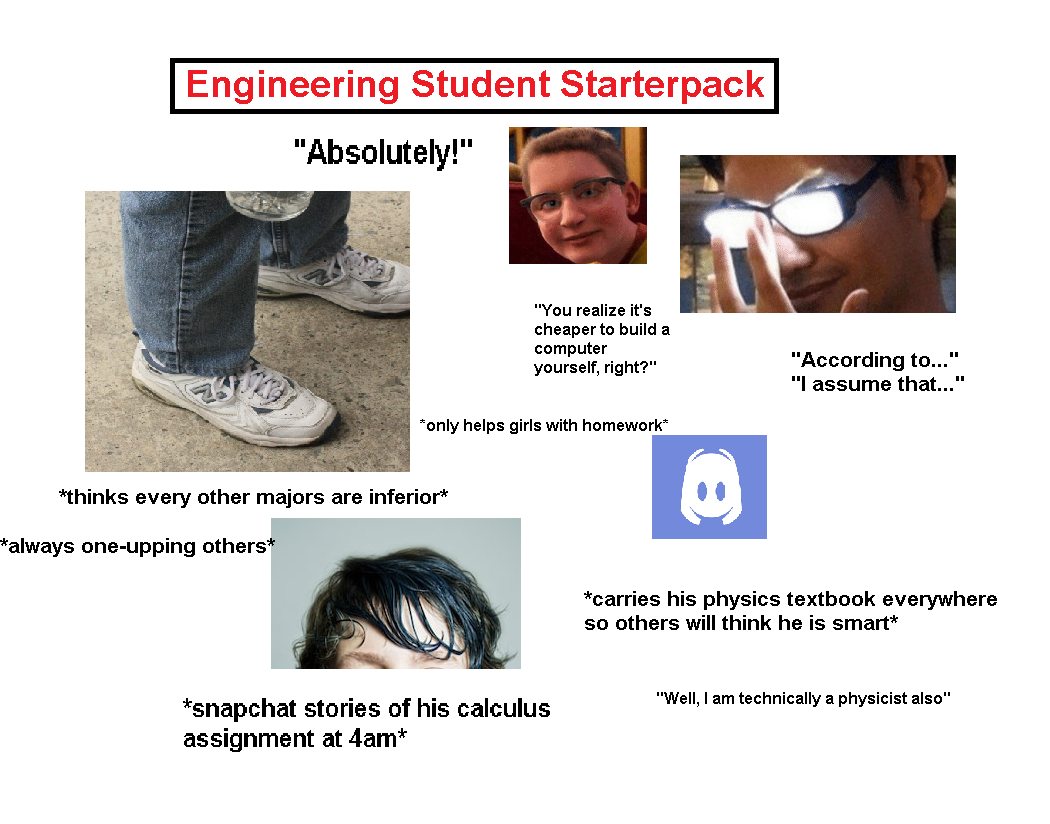Don't Be a STEM-Lord
STEM-Lord * /n (plural STEMlords) (slang, derogatory) * A self-important, condescending person with a background and/or interest in a STEM field, particularly one who disparages the humanities.

 Introduction
Introduction
This term was first mentioned to me by my roommate and perfectly summarized an issue I’ve come across during my time at University. Surprisingly, this term has been coined by Humanities majors who have unfortunately had to interact with these people who often talk down to them as they consider their school work “more intensive” than others but the STEM-Lord can often put down other STEM majors as well.
If you’ve ever taken a STEM class, you’ve had the unfortunate experience of interacting with this sort of person. If you ask about a question on the homework, they scoff at you for not understanding the concept as quickly as them or starting the assignment earlier. When you interact with them, they treat you as though they are wasting their time talking to you. In class, they may try to challenge the professor or ask outrageous questions that deviate too far from the material just in an effort to show to the professor and their peers that they are “smart”. They are the type of person who, when you talk to them, only complains about their workload and often puts down others for ‘taking an easy major’. They OBSESS over their grades and side-eye at those who don’t achieve as highly as them. They often can be found perfecting their resume, finding the perfect opportunity to add and constantly scouring on LinkedIn. Everything feels like a competition to them. They are a hard person to interact with because they aim to put others down and try very hard to come across as intelligent, all in an effort to feel smart because that’s what their ego is tangled around. They identify with being intelligent and they need others to recognize that to foster this narrative as they battle this insecurity. But by doing so, they’re forcing their insecurity on others, putting down other people and making themselves one dimensional. Who wants to have a friend like that? Nobody.
 Why talk about this?
Why talk about this?
I can write about this because I was a STEM-Lord not too long ago. Even before University, I obsessed over what College I got into and what people thought of me. I wanted so badly to go to a prestigious University so people would look at me and think, “oh, he’s so smart and hard-working.” Freshman year, I felt badly that I didn’t go to one of those institutions I had in mind and because so, I felt the need to work harder than everyone else so I could get a certain job that could impress everyone else. It took me to start dating my girlfriend where she pointed out that everything that I talked about was engineering and working out that I realized that I was a one-dimensional person. I only cared about my career and couldn’t interact with anything outside of that. But worst of all, I did it for other people; to fuel this insecurity that I needed other people to see me a certain way so that I would mean anything. But this doesn’t have to be the case. You can be more than points on a resume, you can be more than connections on a LinkedIn page or two digits in a GPA. You’re more than the University you go to. Where you take classes doesn’t define you, just like your major or what you do in your free time doesn’t either. You define who you are, you can be so much more. So, in a way, this writing serves as a letter to my past self or anyone who stands in the shoes I used to wear.

 Origins
Origins
So how do STEM-Lords come to be? Often times, it can start out young, when kids are rewarded in school for being smart. Others tell them that they are smart, they are important because they performed well on an assignment. This external validation makes the child feel good, so they continue to work hard this way to feel that way again, to get that validation from someone else again. On the Andrew Huberman podcast, Professor Huberman discussed the study, “The Effect of External Reward on Interest and Quality of Task Performance in Children of High and Low Intrinsic Motivation” by Loveland and Olley that was interestingly conducted at Umass Amherst in December of 1979, where I go to school! In this study, the researchers split up a 24 preschoolers into two groups, one group where when they drew a picture, they received a reward and another where the kids received nothing for drawing. Then after a week, the researchers stopped rewarding the first group for drawing. What they found was that the first group of kids, the ones rewarded for drawing, stopped picking up the crayons and paper when they weren’t given rewarded for doing so. But the other group of preschoolers, the ones who never received any rewards for drawing, continued to draw because they found it fun- they did it because they liked drawing itself and not for any external reward. The problem we face here is that these STEM-Lord types grew up performing well in school, trying to be top of the class because they needed the external validation- always being told that they were smart. This is seen in most STEM majors where most of the kids select their major because they want a high paying job afterward so they can look impressive to other people. Who won’t be impressed when they make 6 figures right after graduation working for Amazon! But they secretly resent what they do. They don’t enjoy doing it because they like the major, just like the kids from the first group only drew pictures because they were rewarded for doing so. Because they resent what they do everyday, they need others to know how smart they are and to put down others who don’t have the same workload just to justify their course selection and fuel their fragile ego that needs recognition from others.
 Reflect
Reflect
So STEM-Lords, ask yourself: Why do you think you’re better than anyone else? Why complain about your course load to others who never asked? Why make your major your personality and your social life? Why put down others to make yourself feel better?
The classes and grades you take do not make you better than anyone else, you chose your major knowing what the workload would be like, don’t continue to justify that choice by putting others down.
The lesson here is to not let any one thing become your personality, whether it’s the gym, looking a certain way, drinking, hooking up etc. We as people like to put labels on things and put people into categories but you don’t need to put yourself into one. You can become a multi-dimensional person by stepping back and asking yourself why you do what you do and finding motivation in another way. You can find other passions and interests outside of your career. You can pursue developing relationships through deep conversations, this way you will have a connection to someone outside of what they can offer you in respect to your career. You’re a person with so many interests and emotions, don’t let all that be funneled into one category and weighed by other people. Be unforgivingly yourself, you just got to find that first!